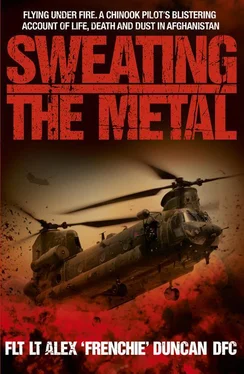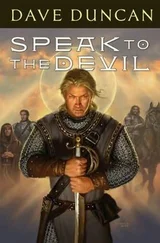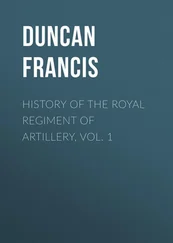Several other rounds hit the cab, but none of them caused anything more than holes in the fuselage.
Luck seemed to be with all of us that day, but none more so than Mick Fry. The RPG that detonated next to the aircraft caused the port door to cave in, burn marks to the side of the aircraft and shrapnel that tore through the root of one of the blades on the aft head. It exploded at the precise moment Mick stuck his head into the cockpit. Had he stayed where he was, he’d have taken the full impact of the explosion and would almost certainly have died.

The aphorism ‘lightning never strikes twice’ isn’t meant to be interpreted literally and I guess I’m living proof of the phrase’s fallibility. For me, lightning did strike twice. Am I charmed? I don’t know. I have my superstitions, but I’m smart enough to be a pilot, so I know at a fundamental level that they make no difference. Is life trying to tell me something? Or have I simply been in the wrong place at the wrong time too many times now? Whatever the reasons, I feel like the luckiest man on earth because, against the odds, I’m still alive. I’m still able to be a husband to Alison, and a loving dad to Guy and Max, our two gorgeous sons. I’m still able to walk my two dogs. And I’m still here to tell my story, which has hopefully shone a light on the valuable work done by the Support Helicopter Force.
I know that everyone reading this book will have their own opinions on the war in Afghanistan, but whether you’re for it, against it, or you simply don’t know, never doubt that every serving member of the Forces engaged in the war is putting their life on the line every day and you’ve no idea how proud I am to say that I’m one of them.
All of us who serve in theatre have our own reasons for doing so, and while some people might regard what those of us in the Chinook Force do as dangerous, it pales into insignificance compared with what the guys and girls living in the FOBs and PBs face every minute of every day. For me, and for all my fellow pilots at RAF Odiham, however much we enjoy flying and feel privileged to do what we do, those on the front line are the reason we take risks.
On my last deployment, there was one two-week period where eleven British troops survived who, given their injuries, should be dead. The fact they survived is down to two things – the existence of the MERT and the ability of front line medics. It’s thought that in total, we’ve rescued well over 1,500 casualties in Afghanistan. The fact we’re prepared to fly in under fire to get the wounded out, and the fact that the MERT’s surgeons, paramedics and nurses take the risks they do, means all those soldiers we’ve recovered are still able to be dads to their kids, husbands to their wives, and sons to their mothers and fathers. What more reason do we need?
None of us knows what the future holds, but as long as I have the ability to do so, I’ll be flying and living my dream. Sadly, I’ve learned the hard way not to look too far ahead, because we never know what tomorrow brings. My philosophy now is just to get on with today and let tomorrow take care of itself.
Finally, this is from all of us in the Chinook Force to the guys and girls on the ground in one of the most hostile environments on this planet. In your hour of need, however desperate you may be, fear not because we will come and get you.
2i/c: Second in command.
50 Cal: British L1A1 Heavy Machine Gun, .50 inch (12.7mm) calibre. Usually vehicle-mounted to provide top cover.
Apache AH1: British Army Apache Attack Helicopter fitted with Longbow Radar.
Bingo: Nominated fuel amount sufficent to make it back and land with the minimum fuel allowance.
Bowman: The latest generation tactical communications system used by the British Armed Forces.
CAS: Chief of the Air Staff or Close Air Support, depending on context.
CDS: Chief of the Defence Staff.
CGS: Chief of the General Staff – the head of the Army.
Carbine: Short barrelled SA80 5.56mm used by Chinook and Apache pilots.
Casevac: Casualty Evacuation.
CRM: Crew or Cockpit Resource Management focuses on interpersonal communication, leadership, and decision making in the cockpit. Simply put, it’s a management system that ensures optimum use of all available resources, whether procedures, equipment or people, to enhance the safety and efficiency of operations.
D&V: Diarrhoea and Vomiting is a perennial problem on deployment and no matter where you go in any base, you’re never standing far away from a bottle of disinfectant hand gel or a sign drumming into you how serious and debilitating a bout of D&V is. It spreads like wildfire with predictably debilitating results for operations.
Danger Close: Proximity to a weapon’s effect considered to be the minimum safe point when wearing body armour and combat helmet. The term is used by Forward Air Controllers to indicate that friendly forces are within close proximity of the target. The close proximity distance is determined by the weapon and munitions fired.
DC: District Centre. Commercial/military/political centre of a particular area.
Decompression: Project launched by the MoD in 2006 to act as a buffer between fighting on the front line and being at home. Front line personnel deployed to Afghanistan for four months or longer fly from theatre to Cyprus, where they spend two weeks ‘getting things out of their system’.
Det: Detachment.
DFC: Distinguished Flying Cross, awarded in recognition of exemplary gallantry while flying during active operations against enemy forces.
Dicking: A term coined by British soldiers in Northern Ireland during the 1970s referring to terrorist surveillance of location and movements of military forces or assets.
Dushka: Nickname of the DShK, a Soviet heavy anti-aircraft machine-gun firing .50 cal (12.7mm) rounds. Nickname ‘Dushka’ (lit. ‘sweetie’, ‘dear’), from the abbreviation.
Fast Air: Offensive military jet aircraft such as the Harrier GR-7/9, Tornado GR-4 or F-16.
Flechette: Eighty five-inch tungsten darts fired from a rocket travelling above Mach 3.
FOB: Forward Operating Base.
Force protection: Military term given to a range of measures designed to preserve and protect the combat power of our own forces.
GAPAN: Guild of Air Pilots and Navigators, established in 1929, and a Livery Company of the City of London. The Guild advises the Government on air safety and aeronautics. The Guild presents trophies and other awards for outstanding performance in aviation by individuals or organisations.
Green Zone: Lush habitation of irrigated fields, hedgerows, trees and small woods on either side of the Helmand River, bordered by arid desert. Most of Helmand’s population lives here and the natural cover means a high concentration of Taliban forces.
HALS: Hardened Aircraft Landing-Strip. Small runway.
HEAT: High Explosive Anti-Tank. An explosive-shaped charge that on impact creates a very high-velocity jet of metal in a state of superplasticity that can punch through solid armour.
HEDP rounds: High Explosive Dual Purpose 30mm cannon rounds.
Читать дальше













